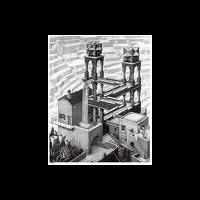Hozzászólások: 18
Nyelv: English
Donniedillon (Profil megtekintése) 2010. január 28. 1:12:23
niko-tina:Sorry. I must have had an itchy "c" finger.
BTW: cat = kato
Vilinilo (Profil megtekintése) 2010. január 28. 1:27:15
ceigered (Profil megtekintése) 2010. január 28. 10:09:13
Vilinilo:The formation of feminine words in Esperanto may not be sexist, but it's ugly. That assimetry in the assignement of gender looks like an improvised patch, which implies bad design.Then we can all use iĉo to differentiate symmetrically!

La homiĉo diris al la homino: "Forgesu ni pri sekseco kaj uzi simple nur neŭtrajn vortojn!
 "
" ceigered (Profil megtekintése) 2010. január 28. 11:04:42
niko-tina:Speaking more sociologically: what symmetry are we talking about?I agree with you Niko-tina, hopefully one day people will realise how big of a non-issue gender really is.
Gender? Sex? What do those word mean?
Anyway, I (and I think the person before me) was referring to the physical symmetry of the word - "virino" and "viro" for example - virino has an extra syllable.
Hauxkins (Profil megtekintése) 2010. január 28. 12:37:03
Which is..is there an argument for translating 'woman' as 'malviro'?
Leporino (Profil megtekintése) 2010. január 28. 16:53:19
tommjames:I totally agree. And personally I really like the -ino ending. Sounds very feminine to me.PaulExcoff:It seems sexist to have every noun be, by default, male. (although I'm glad as hell that every noun isn't arbitrarily assigned masculinity or femininity as in French)Nouns are not male by default in Esperanto, they can be either male, female or gender neutral (the latter being the biggest group). Esperanto doesn't have any grammatical gender; any gender that exists is just a matter of the meaning of the word. For example words like frato, viro and knabo are male, but words like damo, matrono and madono are female. Gender neutral words like besto, homo, amiko etc do not default to male and do not require usage of -in and ge- to unmasculate them, although it can be useful to use those suffixes as well as vir- if you want to explicitly show gender for clarificatory purposes (perhaps to avoid people mistakenly thinking you're referring to a male when you're not!) PMEG has further reading about that.
Personally I've never understood the sexism argument. Just because we derive a few words like "patrino" from "patro" it doesn't follow that females are mere derivatives of men. And even if it did, what's so bad about being derived from something? And what makes "being the default" so great anyway? These seem like strange assumptions to me.

Why don't you guys see it this way: patr+O (father) and patr+INO (mother). Then no one derivates from the other.

Oŝo-Jabe (Profil megtekintése) 2010. január 28. 18:35:13
Leporino:I don't see it that way because the -o ending doesn't pertain to gender. If no word was to be derived from the other, one word would have to be patr+o and the other patrin+o. But again, being a derivative of another word is not in any way connected with the importance of the words. "Dikfingro" is just as valuable as "fingro," even though one is the derivative of the other.tommjames:Why don't you guys see it this way: patr+O (father) and patr+INO (mother). Then no one derivates from the other.PaulExcoff:It seems sexist to have every noun be, by default, male.Just because we derive a few words like "patrino" from "patro" it doesn't follow that females are mere derivatives of men. And even if it did, what's so bad about being derived from something? And what makes "being the default" so great anyway? These seem like strange assumptions to me.
Leporino (Profil megtekintése) 2010. január 28. 20:46:43
Oŝo-Jabe:Oh, come on! Why so serious! I was just making a funny suggestion. Of course it doesn't work that way.Leporino:I don't see it that way because the -o ending doesn't pertain to gender. If no word was to be derived from the other, one word would have to be patr+o and the other patrin+o. But again, being a derivative of another word is not in any way connected with the importance of the words. "Dikfingro" is just as valuable as "fingro," even though one is the derivative of the other.tommjames:Why don't you guys see it this way: patr+O (father) and patr+INO (mother). Then no one derivates from the other.PaulExcoff:It seems sexist to have every noun be, by default, male.Just because we derive a few words like "patrino" from "patro" it doesn't follow that females are mere derivatives of men. And even if it did, what's so bad about being derived from something? And what makes "being the default" so great anyway? These seem like strange assumptions to me.
Nobody cares about the dikfingro beeing a derivative, right? But when it comes to male and female words some people get upset.
The -ino-thing works fine to me and it really makes Esperanto easier than other languages.
As a woman I definitely don't feel less worth than a man in Esperantujo.






